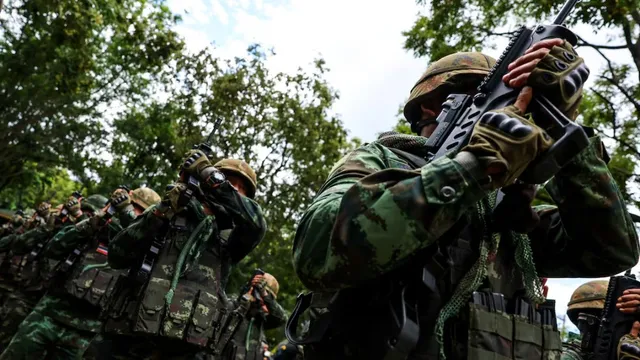- By Akansha Pandey
- Thu, 24 Jul 2025 07:33 PM (IST)
- Source:JND
Thai-Cambodia Border Conflict: The border dispute between Thailand and Cambodia, which has been going on for a long time, took a violent turn on Thursday, with both nations firing small arms, artillery and rockets at each other. Thailand targeted Cambodia's military targets with its air attack, and in response, Cambodia also fired rockets. As per Thailand’s acting PM, at least 10 Thai civilians and one soldier have been killed and 28 have been injured in the clash, while Cambodia released no details on deaths or injuries on its side.
According to the Associated Press, tension between Thailand and Cambodia flared up on Wednesday when five Thai soldiers were killed in a landmine blast. After this incident, Bangkok took immediate action, expelling Cambodia's diplomat and calling back its diplomat from Cambodia's capital, Phnom Penh. Thai authorities also sealed all the eastern borders with Cambodia. Thai officials claimed that landmines had recently been planted on routes that both sides had agreed were supposed to be safe. They also said that the tunnels were Russian-made and were different from those used by the Thai military.
In response, Cambodia dismissed Thailand's claims as "baseless allegations" and said that many unexploded landmines and other weapons already exist in the area due to wars and conflicts of the 20th century. Cambodia also brought all diplomatic relations to the last mile and called back most of its embassy staff from Bangkok.
Why Is There A Border Dispute Between Thailand And Cambodia?
There is an 817-kilometre-long border between Thailand and Cambodia, which is based on the French colonial map. Though efforts are always made to maintain peace along the border but due to temples such as Preah Vihear, Ta Moan Thom and Ta Muen Thom, located in densely forested areas, there is always a dispute on this border.
Built in the nineteenth century on the Dangrek mountain by the Khmer Empire, the Preah Vihear temple is the main cause of the border dispute. This temple is geographically closer to Thailand, but in 1962, the International Court of Justice (ICJ) gave its verdict in favour of Cambodia on this temple. At that time, Thailand accepted the decision with dissatisfaction. But tensions increased when, in 2008, Cambodia granted UNESCO status to the temple. Thailand opposed this, saying that UNESCO's map encroached on the disputed area of 4.6 square kilometres near the temple.
The incident led to protests, political unrest and violent border clashes between the two countries. After this, the dispute between the two countries increased further from 2008 to 2011, and they also accused each other of violating independence and sovereignty.
In 2013, the ICJ again confirmed that the Preah Vihear temple belongs to Cambodia, and that Thailand remove its soldiers from the site. Thailand also followed the order, but the matter has not been resolved till now.
What Led To Recent Clashes Between Thailand And Cambodia?
The new round of confrontation started on Thursday after the Thai army claimed that its troops detected the sound of a drone before spotting six armed Cambodian soldiers approaching Thai military positions. The Thai Army further said that the soldiers deployed at front positions tried to de-escalate the situation by shouting a warning, but Cambodian troops allegedly started firing.
However, Cambodia denied these allegations and claimed that Thailand first deployed a drone and then initiated the attack. Cambodia’s Defence Ministry said that its forces acted solely in self-defence in response to what it called an "unprovoked incursion" by Thai troops into Cambodian territory.
The Thai army later confirmed launching airstrikes on military targets inside Cambodia. In response, Cambodia’s Defence Ministry accused Thai jets of dropping bombs on a road near the historic Preah Vihear temple. Meanwhile, Thailand’s Foreign Ministry accused Cambodia of striking both military and civilian targets within Thai territory, including a hospital.
"The Royal Thai Government is prepared to escalate our defensive measures should Cambodia continue its armed attacks and violations of Thai sovereignty, in accordance with international law," said Thailand Foreign Ministry spokesperson Nikorndej Balankura.

